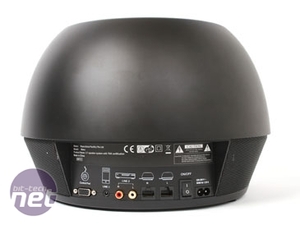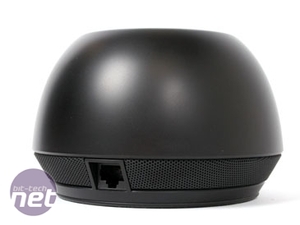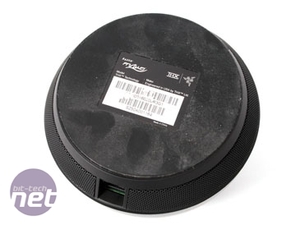What We Makos Of It
Actually in use, the Makos turn out to be a double-edged sword unfortunately and while the speakers do have some very definite benefits thanks to their unusual design, there are some faults you just wouldn’t expect of a £200+ audio system.Let’s keep it simple though and start from the top. When we switch on the Makos and turn on the volume on some of our favourite music – which this week is Fiona Apple’s Extraordinary Machine and Alkaline Trio’s From Here To Infirmary – does the sound fill the room like it should?
Well, in a word, yes. It does. Whether you’re sat in front of the desk, standing being them or on the other side of the office, in Harry’s chair, with a cabinet between you and the speakers themselves…they still sound good. It’s still possible to point to where the sound is coming from obviously, but it’s not as easy as it might be with usual speakers. The speakers aim the sound down, but also at 360 degrees.
The sound isn’t just omnipresent though, it’s also clear and distinct. Music comes across purely, as if it were distilled through centuries worth of volcanic rock in the French Alps – only to be bottled by pretentious-sounding millionaires. It doesn’t matter if you’re listening to the smoky melodies of Fiona Apple’s tortured and out-grown angst, or the thrumming warbles of Ben Folds Five – the Makos sound good.
Not just good in fact, but very good – we were able to pick out backing instruments we’d never heard before in songs that we’d heard a billion times.
As always though, there is a downside – in this case, the bass. The beefy subwoofer for the Makos may be as big and weighty as the entire Heavyweight Boxing Championship, but it only manages to hit as hard as a lady in a willy-waving contest. It really is strikingly pathetic that, even with bass turned to maximum and some slammin’ Drum & Bass playing, we still found the bass left us wanting.
However, with some tinkering we did get some more bass-iness out of the Makos in the end and what we got was a satisfyingly crisp sound that lacked a little punch, but that won't be a problem for a lot of us. Nobody wants their music ruined with an overzealous bass track that knocks you out cold, but we do expect a bit more than a stroke of our cheeks.
Connectivity is a problem for the Makos too, as the whole thing connects to the PC with only a 3.5mm cable, which just won’t cut it for any audiophile looking to spend more than £240 on a 2.1 speaker system. There’s no optical connection and no SPDIF – just 3.5mm and RCA. That said, at the same time there are some clever connectivity touches. The satellite speakers use just a single Ethernet cable each, for example. That means there’s no fiddling with separate power leads and, if one breaks, you’ve usually got a spare handy.
All this wouldn’t be so bad though if the Makos weren’t so expensive. The bass may not be powerful, but it is accurate and will be enough for anyone who wants to actually hear their music and not just drums pounding in their head. Likewise, the connectivity may not be all that great – but for most gaming set-ups and casual music listeners it’ll more than suffice.
At more than £240 / $350 though, the Makos are firmly embedded in the high-end enthusiast price range – and one you enter that price bracket then there are a lot of other, frankly better products to contend with – ones that offer increased connectivity, wirelessness, improved bass response and a more focused sense of sound.
The Razer Makos are a great proof of concept, showing that it is possible to fill a room with sound from just a pair of 2.1 speakers, but that concept hasn’t been fully realised yet. Razer still has to do some tweaking to the product in order to make the Mako speakers a truly compelling purchase.
- Performance
- x
- x
- x
- x
- x
- x
- x
- x
- -
- -
- 8/10
- Ease of Use
- x
- x
- x
- x
- x
- x
- x
- -
- -
- -
- 7/10
- Value
- x
- x
- x
- x
- x
- -
- -
- -
- -
- -
- 5/10
- Overall
- x
- x
- x
- x
- x
- x
- x
- -
- -
- -
- 7/10

MSI MPG Velox 100R Chassis Review
October 14 2021 | 15:04













Want to comment? Please log in.